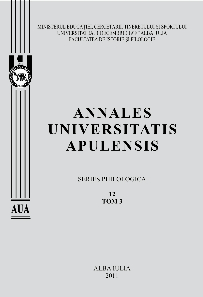André Malraux – témoin et acteur de la condition humaine
André Malraux – Witness and Actor of the Human Condition
Author(s): Adina CurtaSubject(s): Literary Texts
Published by: Universitatea »1 Decembrie 1918« Alba Iulia
Keywords: human condition; scare and anxiety; despair; suffering; memory; loneliness
Summary/Abstract: The present study aims to take out of the text of The Human Condition by André Malraux the essential characteristics of what the writer considers to be the human condition. A first observation must take into account the novel’s historical dimension, its placing at the core of important events that stirred the Far East people life in the first decades of the 20th century. Witness and active participant to these events, Malraux identifies in their development and the attitudes the different characters who adopt a number of features that add the human condition a mixture of complementary meanings. Thus we have to do at the same time with what we called a-temporality meaning the getting out of time of the person about to accomplish a major act of his existence, then discontinuity consisting in the breaking up between thought contents and face to face expression in the key moment of accomplishing that act. The other aspects would be scare and anxiety experienced in the solitude strengthened by the huge sky contemplation, to which a sensation of despair caused by ceaseless flow of events is added, together with unavoidable suffering with its multiple significance – whose supreme teaching seems to be the necessity of accepting destiny the way it is. Next would be loneliness as the extreme form of suffering, under the circumstances when the only real requirement is not to remain alone in the middle of serious events. Then comes the need to give death a meaning, completed by the importance and role of memory in understanding the present, the significance of developing events, of attitudes and gestures of the others. Equally important are the need of getting free felt as an attempt to get rid of the human condition limitative constraints, fear that does not exclude courage without being in its turn excluded by its desperate games, but that can disappear when lacking imagination – that is to say fear as the result of exciting imagination. Let’s add the wear out of any repeated experience no matter how strong it was and, last but not least, the borrowed meaning namely felt through somebody else, the lost meaning of life due to the permanent absence of a dear person. These 11 features of the human condition as seen and defined by Malraux in the framework of a number of extreme situations, experienced in the middle of outstanding events, appear as a sum of complementary dimensions drawing up a tragic human condition, both implacable as the passing of time and moldable through the characters’ force. The well mapped temporal dimension of these characteristics in the personality of the novel’s characters dissolves in the human eternal one. Thus, the human condition described and analyzed by Malraux is not a particular but a universal one. Each of us could successively identify himself or herself with a fundamental feeling, experience or attitude a certain character in the novel embodies.
Journal: Annales Universitatis Apulensis. Series Philologica
- Issue Year: 12/2011
- Issue No: 2
- Page Range: 191-198
- Page Count: 7
- Language: French

